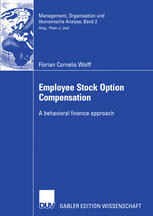

Most ebook files are in PDF format, so you can easily read them using various software such as Foxit Reader or directly on the Google Chrome browser.
Some ebook files are released by publishers in other formats such as .awz, .mobi, .epub, .fb2, etc. You may need to install specific software to read these formats on mobile/PC, such as Calibre.
Please read the tutorial at this link: https://ebookbell.com/faq
We offer FREE conversion to the popular formats you request; however, this may take some time. Therefore, right after payment, please email us, and we will try to provide the service as quickly as possible.
For some exceptional file formats or broken links (if any), please refrain from opening any disputes. Instead, email us first, and we will try to assist within a maximum of 6 hours.
EbookBell Team

4.0
46 reviewsStock options have become a common part of the compensation of executives in many companies. Their use has created a significant amount of controversy among academics as well as among the general public.
Florian Cornelis Wolff addresses an aspect often overlooked in debate but crucial for assessment: How do executives themselves see their stock options? How do their personal expectations and risk preferences affect the value they assign to them? To answer these questions classical option valuation approaches need to be combined with recent findings from the field of behavioural finance. The result is quite surprising: It is because people behave irrationally that stock options may be worth their money.